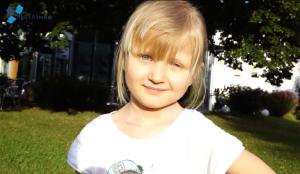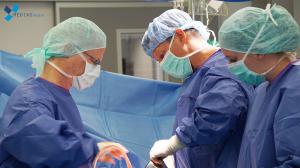A story of a little girl who did not give up fighting cancer.
When a child is diagnosed with cancer, it is a tragedy that completely disrupts parents’ lives.
The success of Regional Chemotherapy lies in the fact that medication is delivered directly to the tumor site, allowing to significantly increase absorption and intensifying the effect.”
TORONTO, CANADA, March 22, 2017 /EINPresswire.com/ -- Battling cancer often involves seeking out alternative treatments. In some cases support and a new lifeline may come unexpectedly. — Prof. Karl R. Aigner
In support of the #DAMAGECACNER Project, patients with stage-four metastatic cancers, who undergone Regional Chemotherapy treatment, shared their stories. Their loved ones joined them in conversations. The #damagecancer Project project is an ongoing initiative of Medias Health Inc.
At the age when smiling children attempt their first steps, or practice their social skills, making friends in a daycare, little Melina (5) already grew accustomed to the settings in numerous hospitals. This cute little girl suffered from an aggressive type of head and neck cancer. She endured countless chemotherapies and irradiations, and yet there seemed to be no hope for her. One very special therapy turned out to be her new lifeline.
At Melina's birth a tumor was found on the left side of her little throat. Her doctors were saying to to her parents Katharina (36) and Eugene (37) that the tumor was benign and would disappear with time. At first everything looked good. Unfortunately, when the child was 18 months old, the tumor came back. This time it was malignant, and it grew to measure ten by six centimetres.
Melina’s mother recalls her shock at the time. The parents hoped that their “little sunshine” would be quickly restored to health with standard chemotherapies. The reality turned out to be different. Melina tolerated the treatments very badly. The little girl suffered from nausea, difficulty swallowing, extreme weight loss, nose bleeding, joint pain and insomnia. The biggest problem was that the tumor could not be surgically removed, because it had already grown around an artery. The doctors tried their best, but after every surgery the cancer came back with a vengeance.
The parents were desperately looking for therapeutic alternatives. Last autumn, a clinic recommended the so-called Regional Chemotherapy cancer treatment (RCT). Searching the Internet, Katharina came across the term "experimental" and "scientifically not proven". But she did not let herself be discouraged. Numerous reviews also pointed out to incredible therapeutic successes RCT. "I knew instinctively that this was our last chance ...", says Katharina today.
Prof. Karl R. Aigner, medical director of a renown private oncological surgery clinic in Germany and world's leading expert on RCT, said that Melina suffered from a rhabdomyosarcoma. This type of cancer is caused by degenerative or not fully developed cells of the muscle or connective tissue. He noted that whenever such tumor is removed surgically, it would comes back aggressively, if the surgery was not a complete success. Melina could have dare consequences. The cancer could have spread in the throat or grow into the cranial base, causing paralysis and suffocation.
Prof. Aigner recalls that initially there was an issue getting approval to apply Regional Chemotherapy for pediatric oncology. Prof. Aigner had built a new building for his clinic in the autumn of 2015. The health authority initially refused to allow him to treat children. Prof. Aigner at first decided to sent Melina to specialized surgery department of the pediatric oncology clinic at the local university. Unfortunately, they did not succeed in their treatment.
In the meantime, the district councilor of Burghausen had warmed up to the idea of RCT and managed to ensure that Prof. Aigner was given permission to use his unique therapy for children with cancer.
There was another problem. The family health insurance provider refused to pay for the alternative therapy. "The pediatric clinic should have explicitly prescribed this treatment in their paperwork," explains Katharina. It was then that her husband and she decided to sell their car. Luckily for them, they did not have to do that, because Prof. Aigner agreed to treat the little girl free of charge. He also paid for materials and medication from his own pocket.
"We are eternally grateful to him," says Katharina, referring to Prof. Aigner. She also notes that RCT seemed to be the only method that could help Melina.
"The success of Regional Chemotherapy method lies in the fact that medication is delivered directly to the tumor site through arterial blood, thus, allowing to significantly increase absorption and intensifying the effect.",— explains Prof. Aigner. "This means that healthy organs are also spared." In Melina’s case, the agent was delivered to the tumor site via a child port, the Portolino, which was developed by Prof. Aigner. The Portolino port was inserted in Melina’s neck. Only after two treatments, the tumor had shrunk to the point that it could be completely removed surgically.
After all the excitement of the last years, Katharina and Eugene can now breathe easier. "RCT was our last resource for rescue, and it has given our child a chance for a new life!"
Contact:
Medias Health Inc. | USA & Canada: 1-888-896-0251 | International: +1-647-986-5977
info@mediashealth.com https://www.regionalchemotherapy.com www.mediashealth.com www.facebook.com/mediashealth @mediashealth
Medias Health Inc.
1-888-896-0251
email us here
—————————
#DAMAGECANCER Project: Melina, — a little girl who did not give up fighting cancer.


